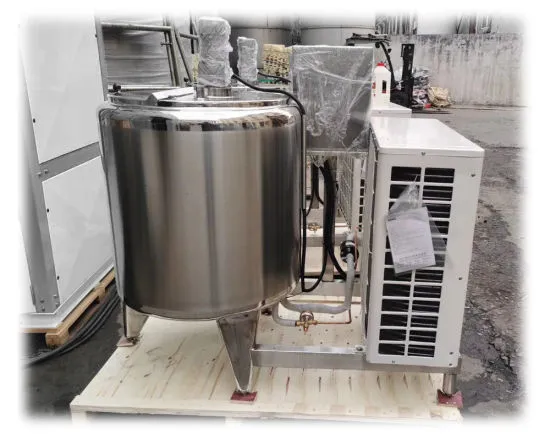- November 14, 2023
- Posted by: VisionPlus Automation
- Category: milk chillers

The Impact of Milk Chillers in the Kenyan Dairy Industry
The Impact of Milk Chillers in the Kenyan Dairy Industry
Introduction
The dairy industry in Kenya has witnessed transformative changes over the years, with advancements in technology playing a pivotal role. Among these technological innovations, milk chillers have emerged as a critical component, revolutionizing the dairy supply chain. This essay delves into the profound impact of milk chillers in the Kenyan dairy industry, exploring how these cooling systems have enhanced milk quality, prolonged shelf life, empowered farmers, and stimulated economic growth.
1. Preserving Milk Quality
Milk chillers have significantly contributed to preserving the quality of milk from the point of production to the end consumer. Immediate cooling after milking helps inhibit the growth of bacteria, maintaining the freshness and nutritional value of the milk. This has led to an improvement in overall milk quality, meeting both local and international standards.
2. Prolonging Shelf Life
The introduction of milk chillers has extended the shelf life of milk products. By rapidly cooling the milk to optimal storage temperatures, spoilage is minimized, and the risk of bacterial contamination is reduced. This extension of shelf life benefits farmers, processors, and consumers alike, ensuring that milk remains fresh for longer periods.
3. Empowering Small-Scale Farmers
Milk chillers have played a crucial role in empowering small-scale dairy farmers in Kenya. These farmers can now access cooling facilities within their communities, eliminating the need for immediate transportation to distant processing plants. This not only reduces logistical challenges but also ensures that small-scale farmers can participate more actively in the dairy supply chain.
4. Reducing Milk Wastage
Before the widespread adoption of milk chillers, inadequate cooling methods often resulted in significant milk wastage due to spoilage. Milk chillers have drastically reduced this wastage by maintaining the freshness and quality of milk, allowing for better utilization of the produced milk and minimizing economic losses for farmers.
5. Enhancing Dairy Farming Practices
The incorporation of milk chillers has spurred the adoption of best practices in dairy farming. Farmers are now more inclined to adhere to stringent hygiene standards during milking and handling, as the benefits of preserving milk quality and securing a reliable market become apparent. This has led to an overall improvement in the hygiene and sanitation practices within the dairy industry.
6. Stimulating Economic Growth
The impact of milk chillers on the dairy industry has transcended individual farms and businesses, contributing to broader economic growth. As the quality of Kenyan milk improves, there is an increased potential for export opportunities, bolstering the country’s economy and strengthening its position in the global dairy market.
7. Fostering Innovation and Investment
The adoption of milk chillers has fostered innovation and investment in the dairy sector. Entrepreneurs and businesses are now more inclined to invest in modern cooling technologies, leading to the development of a robust and competitive dairy industry ecosystem.
8. Meeting Regulatory Standards
Milk chillers have played a crucial role in helping the Kenyan dairy industry meet and exceed regulatory standards for milk quality and safety. The adherence to these standards not only benefits local consumers but also opens doors to international markets that demand stringent quality assurances.
Conclusion
In conclusion, the impact of milk chillers in the Kenyan dairy industry has been transformative, touching every aspect of the dairy supply chain. From preserving milk quality and prolonging shelf life to empowering small-scale farmers and stimulating economic growth, these cooling systems have become integral to the success and sustainability of the industry. As Kenya continues to position itself as a key player in the global dairy market, the role of milk chillers will remain indispensable, driving advancements, fostering innovation, and ensuring that “Chilling Success” continues to define the future of the Kenyan dairy industry.
